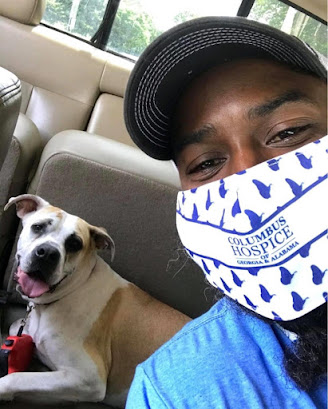Even during a public health crisis, hospice and palliative care professionals rise to the challenge of providing compassionate, person-centered care in the community. Columbus Hospice of Georgia and Alabama exemplifies #hapcFacesofCaring by recognizing the unique bond that many of their patients have with their beloved pets and caring for these pets like they are their own.
The COVID-19 pandemic brought on many changes for our communities and modifications in the workplace. Columbus Hospice of Georgia and Alabama strived to maintain as much “normal” as possible to our patients and caregivers. Part of this was ensuring that our patients and caregivers continued to receive as much support as we could safely provide during their end of life journey.
The volunteer services department at Columbus Hospice manages the Pet Peace of Mind Program for patients. The pandemic has brought increased isolation, sadness, and for many, diminished physical contact. One thing that Pet Peace of Mind recognizes is the powerful emotional and physical connection that pets can provide. Columbus Hospice continued to provide Pet Peace of Mind services through the pandemic which in turn impacted the lives of our patients, caregivers, and staff in a positive way.
When COVID-19 precautions first started, there were many efforts made to keep patient care at Columbus Hospice as uninterrupted as possible. Life did not stop, and emergencies still came up - even with patients’ pets. Many veterinarians had to modify how they provided their services. Some had limited scheduling, long waits, and caregivers had to wait in the car while their pets were seen. Ms. Q had 2 dogs and 2 cats, and they all needed care. The patient and caregiver were unable to transport the pets to the vet but with the team efforts of a volunteer, a volunteer coordinator, and a hospice nurse, all animals got the care they needed. The patient was thankful that all her fur babies received care and it decreased some of her stress.
Diamond’s owner had two major things in his life that made being at home alone more comfortable: Diamond and Diamond’s older brother, Buddy, a distinguished, greying 12-year-old black lab. Buddy and Diamond’s dad was a Columbus Hospice patient and he died during the month of May. The patient lived alone, and his only regular companions were Buddy and Diamond. His caregiver lived out of town and knew very little about either Buddy or Diamond’s history. When the patient died the caregiver was scrambling from two hours away trying to arrange Buddy and Diamond’s future. PPOM had been supporting the care of Diamond and Buddy while the patient was on Columbus Hospice and was able to provide vet information and history about the dogs to the caregiver. Sadly, Buddy died a few days after his “dad” but PPOM was able to support Buddy staying in the home with the patient until the patient died. Two-year-old Diamond, however, found a new home with the help of Columbus Hospice and is thriving with his new dad Cheron.
While the focus of Pet Peace of Mind isn’t about pet therapy, it recognizes the positive impact animals have on humans. Beethoven, the Columbus Hospice therapy dog, had been visiting a patient regularly for about six months in a nursing home facility prior to the pandemic. The facility this patient lived in suspended family, friends, or volunteers from visiting patients as a precaution. Volunteer Shannon and Beethoven got creative and did a visit outside a patient’s window on Easter. Shannon said that the smile on the patient’s face when she saw Beethoven through the window was priceless.
If you would like to share the creative ways your hospice and palliative care team is caring for patients amid the COVID-19 crisis, please send us your photos and stories so you can be featured in the #hapcFacesOfCaring campaign.











